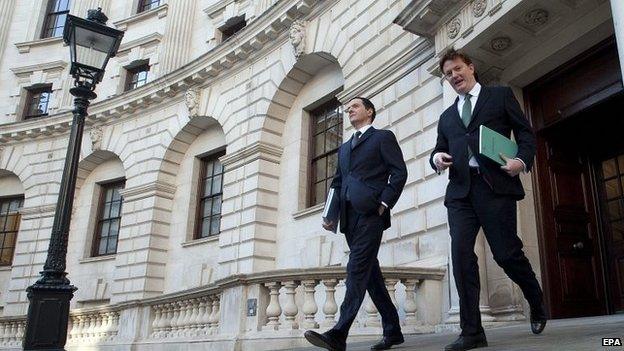Osborne: UK lead role in Mars mission
- Published

The prototype for the ExoMars rover was displayed earlier this year at the Airbus test facility in Stevenage
In his Autumn Statement, Chancellor George Osborne has announced the UK will play the "lead role" in Europe's ExoMars mission to the Red Planet.
He also confirmed a £235m materials science institute for Manchester.
Mr Osborne loosely outlined how his previous commitment of £1.1bn per year on science infrastructure, to 2020-21, will be spent.
These measures join a £200m icebreaker research ship announced in April, and the Met Office's £97m supercomputer.
Although they do not represent "new money" for science outside of previous commitments, the announcements come amid belt-tightening across government spending: Mr Osborne said there would be two more years of cuts to departmental budgets.
George Osborne: "Our ambition is to create a northern powerhouse as a complement to the strength of our capital city"
The new facility for materials research at Manchester University will be called the Sir Henry Royce Institute, and will have satellite branches in Leeds, Liverpool, Sheffield, Cambridge, Oxford and London.
The Autumn Statement also includes £113m for a big data research centre in Hartree, Daresbury.
Search for life
The government's commitment to the ExoMars programme amounts to £55m, alongside a similar amount for the International Space Station (ISS). This more than triples the sum offered as a "one-off" payment to the ISS two years ago.
Both amounts were promised at a European Space Agency (Esa) ministerial meeting on Tuesday, by representatives of the UK Space Agency.
Also among the UK's increased commitments to Esa was £130m to be spent on satellite telecommunications projects.
Esa's Mars mission is scheduled for 2018 and it now appears the rover will be built in the UK before being sent to the launch pad. It will drill, collect and analyse samples on the Martian surface and search for signs of life.
According to the Department for Business, Innovation and Skills, work on ExoMars will create more than 200 jobs and "vital spin-off technologies".

George Osborne said there would be two more years of cuts to departmental budgets
Joking at the expense of the opposition benches, Mr Osborne said: "We on this side of the house have often gazed at the barren and desolate wastelands of the Red Planet. We have long given up hope of finding intelligent life there. But signs of any life at all would be a major advance."
All these funding allocations fall within a £0.8bn commitment to new research initiatives, which in turn sits within a £2.9bn "Grand Challenges fund". The remainder of the government's £5.9bn investment in research infrastructure will be spent on existing facilities, "to ensure they remain world class".
Introducing his comments, Mr Osborne said that science was a "personal priority" for him as chancellor. He also said that the Rosetta comet mission had "captured the nation's imagination".
Elsewhere, the chancellor announced government-backed loans of up to £10,000 for all young people taking postgraduate masters degrees.
'Danger signs'
Reacting to the statement, Institute of Physics president Frances Saunders said she was "pleased that there is recognition from government of the continuing value of investing in science", but cautioned that long-term commitment was essential.
"While one-off initiatives such as the Manchester centre are welcome, we'd like to see how they intend to deliver a sustained commitment to science and innovation in their forward strategy," Dr Saunders said.
"Previous Government investments in science and engineering have delivered huge economic and societal benefits, and a long-term commitment to sustain that investment can ensure that they continue to do so into the future."
The Campaign for Science and Engineering, external welcomed the allocations of existing funding but warned that there were "danger signs" for wider and longer-term investment in science.
Its director Dr Sarah Main said: "The problem here is that the Chancellor's welcome words are not always matched by actions across government.
"If the government would commit to ring-fencing the science budget in real terms, matching capital investment with resources so that new facilities can be run well, and setting a trajectory for investment in science above growth, we would see a real transformation in the UK's fortunes and future prospects."
Imran Khan, the British Science Association's chief executive, commented that science "needs to be an increasingly integral part of the UK's national identity".
"I find it a really important signal that in the middle of one our biggest bits of political theatre, the Chancellor has found time to talk up British science, including its role in rebalancing our economy," Mr Khan said.
"More needs to be done, but this kind of political emphasis is a vital pre-requisite."
Follow Jonathan on Twitter, external